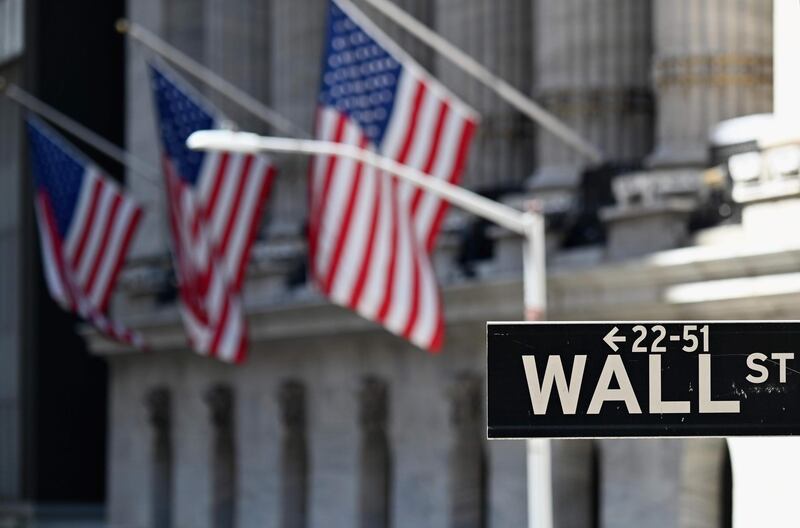Stocks in the US closed a notch below their all-time high on Wednesday, boosted by a surge in technology stocks, as improving economic data and hopes for a potential Covid-19 pandemic vaccine buoyed investor sentiment.
The S&P 500, which briefly climbed above its February 19 record close of 3,386.15 climbed 1.4 per cent. Ten of the benchmark index’s 11 industry sectors rallied with technology, health care and consumer discretionary shares leading the gains.
The Nasdaq Composite outperformed the S&P index with a 2.3 per cent rise. Apple, Microsoft, Amazon and Tesla all jumped. Treasury yields dropped after the government sold $38 billion (Dh139.46bn) in 10-year notes. Gold rallied and silver joined the bullion’s rebound.
“The buy-everything trade returned with a vengeance overnight, greenlighted by higher than expected US inflation and core Inflation,” Jeffrey Halley, a senior market analyst for Asia Pacific at Oanda, said.
The continuation of the rally was due to a "sigh of relief that the US isn't facing deflationary pressures”, he said.
Core inflation in the US rose to 1.6 per cent, a four-month high, following 1.2 per cent in June. Consumer prices also saw a more-than-expected jump, with the consumer price index rising 0.6 per cent from the prior month. It follows a 0.6 per cent gain in June, the US Labour Department figures showed on Wednesday.
Stocks markets in the US, the world's largest economy, ended their longest ever bull run in March when the S&P 500 Index and the Dow Jones Industrial Average both fell into bear market territory.
More than $20 trillion was wiped off the value of financial markets globally, but US equities have since staged an unprecedented rally. The index Wednesday capped its 50 per cent gain since the March lows as investors hoped for a breakthrough in the development of a coronavirus vaccine.
Earlier this week, the US government signed a $1.5bn deal with the American biotech company Moderna, which is working on a mRNA vaccine, to acquire 100 million doses. Russia has also given regulatory approval to the world's first Covid-19 vaccine, two months after the developer started clinical testing. Russia plans to produce 500 million units of the Sputnik V vaccine over the next year.
“If I was to describe the market performance over the past six months, the only word that comes to my mind would be ‘surreal’," said Hussein Sayed, chief market strategist at brokerage firm FXTM. "2020 cannot be compared to any other year in terms of the brutal plunge in the S&P 500 and the speed of its recovery.”
The rise in US equities also helped the Stoxx Europe 600 Index continue its rally into a fourth day. The FTSE 100 advanced 2 per cent, while the CAC40 and the DAX in France and German respectively also increased 0.9 each on Wednesday.
However, the rally slowed in Asia on Thursday, with the Nikkei 225 advancing 2.04 per cent, but the Shanghai Shenzhen CSI 300 Index and the Hong Kong Hang Seng Index dropped.
The Stoxx Europe 600 Index declined 0.4 per cent and Germany’s DAX Index dipped 0.3 per cent, during early trade on Thursday. Futures on the S&P 500 Index were also down 0.1 per cent at 1:53pm UAE time.
US weekly jobless data will be the centre of attention later on Thursday. Markets are pricing in initial jobless claims, and continuing claims to remain stuck at 1.2 million and 16 million respectively, Mr Halley of Oanda said.
“What’s more worrying is the army of 16 million jobless in the US, who are craving for the next fiscal stimulus package to pass as infection numbers continue surging," said Ipek Ozkardeskaya, senior analyst at Swissquote Bank, said in a note.








